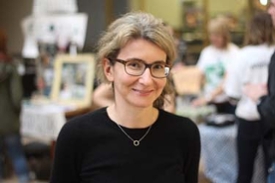MLL: International Conference
Tue. Oct. 3, 2017
 Adina Balint of the Department of Modern Languages
Adina Balint of the Department of Modern Languages
The international and bilingual conference Rencontre des imaginaires, imaginaires transculturels au Canada et dans les Amériques. Littérature et Art du 19e au 21e siècle / Encounters with Imaginaries, Transcultural Imaginaries in Canada and the Americas. Literature and Art from the 19th to the 21st Century took place from September 28-30, 2017, in Winnipeg and Saint-Boniface.
The conference involved collaboration between the French Studies programs at the University of Winnipeg, University of Manitoba (U of M) and Université de Saint-Boniface (USB), and it was initiated and organised by UWinnipeg's Dr. Adina Balint, Associate Professor in French Studies along with her colleagues Dr. Irène Chassaing (U of M) and Dr. Lise Gaboury-Diallo (USB). Dr. Balint brings us this report.
The conference brought together emerging and established scholars and graduate students in the humanities and visual arts, as well as writers and artists, to examine the impact of imaginaries on literary, artistic and socio-cultural discourses.* Members of the public were welcome as well.
This successful event featured prominent keynote literary critics and authors: Zilá Bernd, professor of Canadian Studies at the Unilasalle University, Brazil; Patrick Imbert, distinguished professor at the University of Ottawa; Herménégilde Chiasson, a New Brunswick writer and artist; George Elliott Clarke, the Parliamentary Poet Laureate of Canada; Virginia Pésémapéo Bordeleau, a Quebec Cree and Métis writer and artist; and Guy Gauthier, a Manitoba born and New York based playwright.
We were delighted to have hosted this stimulating and cross-cultural event. We hope this is only one of other enriching collaborative projects between the French Studies programs at the University of Winnipeg, University of Manitoba and l’Université de Saint-Boniface.
See also: Colloque International/International Colloquium
_______________
*We acknowledge the support of the Office of the Vice-President, Research and Innovation, the Dean’s Office and the Department of Modern Languages and Literatures at the University of Winnipeg, Research Manitoba and the Social Sciences and Humanities Research Council of Canada.
